
Sri Lanka presented the initial report under the Anti-Personnel Mine Ban Convention (Ottawa Convention) today, 29th November 2018 at Palais des Nations, Geneva.
Mr. Peter Kolarov, Senior Officer of the United Nations Office for Disarmament Affairs (UNODA) in Geneva received the country report from Secretary to the Ministry of Resettlement, Rehabilitation, Northern Development and Hindu Religious Affairs, Mr. V. Sivagnanasothy on the sidelines of the 17th Meeting of the States Parties (17MSP) to the Ottawa Convention currently underway from 26-30 November 2018.
The report had been prepared by the Ministry of Resettlement, Rehabilitation, Northern Development and Hindu Religious Affairs in collaboration with the Ministries of Foreign Affairs and Defence and other key stakeholders. The report outlines the progress made in mine action in Sri Lanka, acknowledging the assistance and support provided by international and national stakeholders as well as the work that is continuing to make Sri Lanka mine-free by 2020, and further support required to realise targets set.
Ambassador A.L.A. Azeez, Permanent Representative of Sri Lanka to the UN in Geneva, Mrs. Samantha Jayasuriya, Deputy Permanent Representative, Ms. Shashika Somaratne, Minister Counsellor, and Mr. Asanka Neel Fernando, Director, Planning of the Ministry of Resettlement, Rehabilitation, Northern Development and Hindi Religious Affairs were associated with Mr. Sivagnanasothy on the occasion.
Permanent Mission of Sri Lanka
Geneva
29 November 2018

"“Making Sri Lanka a mine free country by 2020 remains our goal and vision", remarked the leader of the Delegation of Sri Lanka to the 17th Meeting of State Parties (17 MSP) to the Anti-Personnel Mine Ban Convention (Ottawa Convention) Mr. V. Sivagnanasothy, addressing the State Parties' Meeting in Geneva on 26 November 2018. He stressed that the ongoing mine action in Sri Lanka complemented the national drive towards strengthening harmony and co-existence, thereby contributing to the achievement of Sustainable Development Goals (SDGs) and economic and social prosperity.
Highlighting the different aspects of mine action progamme implemented by the Ministry of Resettlement, Rehabilitation, Northern Development & Hindu Religious Affairs, Mr. V. Sivagnanasothy, in his capacity as the Secretary to that Ministry, elaborated the 5-Year Strategic Plan (2016-2020) developed in consultation with the National Mine Action Centre and other stakeholders as well as measures taken to fulfil the commitments under the Ottawa Convention.
He also underlined Sri Lanka's commitment and dedicated efforts which led to remarkable achievements in the demining process. His progress update identified the District of Batticaloa as having been declared as a mine-free District in 2017, while contaminated areas in Sri Lanka had been reduced to 26 Sq.km in 2018. It also included an outline of comprehensive measures taken by Sri Lanka to destroy the stockpiles within the next 3 years as well as mine risk education being conducted in Northern and Eastern Provinces.


"Sri Lanka attaches great importance to the CCW, as one of the key instruments advancing humanitarian disarmament, addressing the concerns on maintaining the balance on military necessity and mitigating humanitarian concerns arising from the use of certain conventional weapons or weapons systems".
Minister Counsellor of the Permanent Mission of Sri Lanka Ms. Shashika Somaratne remarked while delivering Sri Lanka's Statement during the general exchange of views at the Meeting of High Contracting Parties of the Convention on Prohibitions or Restrictions on the Use of Certain Conventional Weapons Which May be Deemed to Be Excessively Injurious or to Have Indiscriminate Effects (CCW), on 21 November 2018 at Palais des Nations in Geneva.
Highlighting Sri Lanka's experience on the consequences of the use of landmines, it was noted Sri Lanka is on a firm path towards becoming landmine free by 2020, with the active support of stakeholders. While observing that Sri Lanka has made "considerable headway in determining the extent of contaminated area" as well as the mine risk education programme involving the affected community resulting in a drastic reduction of mine related casualty, Sri Lanka indicated that it will be in a position to share its experience in relation to mine action endeavours with interested parties.

“Preventing the threat of use of biological agents is a key priority for Sri Lanka”, stressed Sri Lanka Permanent Representative in Geneva Ambassador Azeez, addressing the International Seminar convened by the Geneva Centre for Security Policy (GCSP) and the Implementation Support Unit (ISU) of the Biological Weapons Convention (BWC) on 'the importance of disease surveillance and alert mechanisms: lessons for the BWC’ held on 20 November 2018.
The Seminar focused on the operationalization of Article 7 of the Biological Weapons Convention (BWC), which accentuated the importance of technical assistance and international cooperation, to respond effectively to epidemics involving bio-agents.
Representing Sri Lanka at this health - security interface forum, Ambassador Azeez explained the existing disease surveillance mechanism in Sri Lanka, which comprised a wide range of medical and administrative networks including at national, provincial, and district levels. He also drew attention to the role and contribution of hospitals and primary health care units in addressing this challenge efficaciously as well as to laws and policies in place in this context. “Continuing work on strengthening the existing system involved further updating of policies and programmes to empower the National Disease Surveillance System as part of an integrated health-security mechanism”, he added.

"Practical achievement of the target of a world free of cluster munitions demands great dedication, concerted vision and collective initiatives and responses", stated Ambassador A.L.A Azeez, Permanent Representative of Sri Lanka to UNO in Geneva, at the closing session of the 8th Meeting of the State Parties to the Convention on Cluster Munitions in Geneva today, in acceptance of the Presidency of the 9th Meeting of the States Parties (9 MSP-2019).
During the three-day meeting that commenced on 3rd September 2018, Sri Lanka was specially commended for joining this key humanitarian disarmament Convention aimed at banning production, storage, transfer and use of cluster munitions. Sri Lanka acceded to the Convention on 1 March 2018, as the 103rd State Party.

Addressing the Eighth Meeting of States Parties to the Convention on Cluster Munition today, Ambassador A.L.A Azeez, Permanent Representative of Sri Lanka reaffirmed Sri Lanka's commitment to working towards achieving universalisation and to advancement of the objectives of the Convention. The Meeting of States Parties welcomed Sri Lanka as the 103rd State Party, and looked forward to Sri Lanka's leadership in humanitarian disarming.

The Statement delivered by Ambassador Abdul Azeez
Permanent Mission of Sri Lanka to UN in Geneva
03rd September 2018

Addressing the forum on ‘individualized approach’ on the sidelines of the Intersessional Meeting of the Anti-Personnel Mine Ban Convention today, Sri Lanka Permanent Representative Ambassador Azeez recounted how Sri Lanka achieved success in what was considered a perilous task in 2009.
Ambassador Azeez highlighted Sri Lanka’s engagement in demining activity as one which had its own complexity and uniqueness. The National Policy on Reconciliation and Co-existence, in place in Sri Lanka since 2017, both underpinned and nourished the ongoing programmes of peacebuilding and development in the country, he stressed.
The Sri Lanka delegation to the Intersessional Meeting that took place in Geneva from 7-8 June, was led by P. Suresh, Secretary to the Ministry of Resettlement, Rehabilitation, Northern Development and Hindu Religious Affairs and Director of the National Mine Action Centre. Delivering a national statement at the Intersessional Meeting, he thanked the partner countries and partner organizations for the assistance provided for Sri Lanka Mine Action Programme, which he stated was expected to be completed by 2020.
Statement delivered by Ambassador Azeez
Permanent Mission of Sri Lanka
Geneva
8 June 2018

Delivering his initial address to the Conference of Disarmament (CD) of the United Nations, Ambassador Azeez stated that the inaction in the CD over the past twenty years has only led to the loss of a generation of professionals and experts in the field of Disarmament. He stressed “the gap in Disarmament Education is now all too glaring".
Thanking Sweden and Switzerland for giving leadership to the CD at this most crucial time, followed by Sri Lanka early this year, the Permanent Representative of Sri Lanka added that negotiations in the CD, by their very nature, involved addressing challenging issues, exchange of perspectives, and understanding.
The essential task of that process remained as one of endeavouring to achieve consensus outcomes. The eventual goal of general and complete disarmament underpinned the fulfilment of that task, he emphasised.
Permanent Mission of Sri Lanka
Geneva
22 May 2018

“Building a better and secure future for all is a shared call that we can shirk only at our own peril”, stated Ambassador A.L.A.Azeez, Sri Lanka’s Permanent Representative to the UN in Geneva, addressing the Second Preparatory Committee Meeting of State Parties to the Nuclear Non-Proliferation Treaty (NPT) today.
Ambassador Azeez highlighted the importance of the NPT as the global regime for nuclear non-proliferation and disarmament that called for a balanced and non-discriminatory approach to building international peace and security. He stressed that the non-proliferation treaty regime should be taken forward, while promoting and safe guarding the economic development prospects for all, through equal access to the technology advancing peaceful uses of nuclear energy.
He also called upon the State Parties to seriously address the prevalent dichotomy between the lack of progress in disarmament and increasing emphasis and efforts on non-proliferation, urging them to “manifest their support for, and investment in, disarmament training and education provided by the UN and other organizations” .

The Second Preparatory Meeting that began its deliberations on 23rd April 2018 in Geneva would continue until 4th May 2018 and is aimed to help evolve a negotiated outcome at the NPT Review Conference to be held in New York in April/May 2020.
Permanent Mission of Sri Lanka to UN in Geneva
24th April 2018

The window of opportunity that was opened up, and the positive spirit generated in moving forward the substantive work in the Conference of Disarmament (CD) with the adoption of Decision 2119 under the Presidency of Sri Lanka, ’can be carried through to creatively looking at ways and means of arriving at a negotiated outcome at the 2020 NPT Review Conference,’ said Ambassador A.L.A. Azeez, Permanent Representative of Sri Lanka in Geneva. He made these remarks chairing a panel session titled ‘ Reviving the NPT and Conference on Disarmament: Means and Processes to Ensure Success’ at the Framework Forum Roundtable, co-organized in Geneva on 19th April 2018, by the Geneva Centre for Security Policy (GCSP) and several other organizations.
Echoing the words of the UN Secretary General who stated that “it is time to translate the Decision into resumption of negotiations”, Ambassador Azeez added “this development has come up at a critical time when there is growing impatience among the non-proliferation and disarmament community over the long spell of ‘inaction’, spanning over two decades”.
Noting that the second round of consultations of the parties to the Treaty on Non-Proliferation of Nuclear Weapons, are to commence next week in Geneva, to prepare for the NPT review in 2020, Sri Lanka’s Permanent Representative remarked “While non-proliferation should receive a clear focus along with a pronounced emphasis on peaceful use of nuclear energy, the advancement of these objectives would be effective and meaningful when sustained efforts towards the eventual elimination of nuclear weapons follow in tandem”. He said “it was time to be imaginative, yet pragmatic”.
Mr. Sico van der Meer, Clingendal Institute, the Netherlands, and Ms. Tarja Cronberg, Chair,Middle Powers Initiative, Stockholm International Peace Research Institute(SIPRI), joined this panel as speakers addressed ‘How to make the NPT RevCom in 2020 a success?’ and ‘Long term reform needs for the NPT survival?’ respectively.
Permanent Mission of Sri Lanka
Geneva
20 April 2018
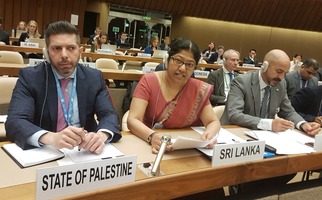
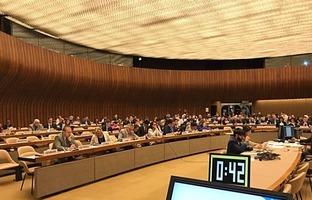
As we pursue Sustainable Development targets with an objective to ‘leave no one behind by 2030’, it is becoming apparent that the kind of impact technology and AI can make in realising the 17 SDG’s and its 169 targets, the CDA a.i. of the Permanent Mission of Sri Lanka to UN, Mrs. Samantha Jayasuriya said addressing the Meeting of the Group of Governmental Experts (GCE) on Emerging Technologies in the areas of Lethal Autonomous Weapon Systems (LAWS) held in Geneva on 9th April 2018. The use of AI to automate UNDP’s Rapid Integrated Assessment (RIA) systems, which helps in determining a country’s readiness for implementation of the Global Development Agenda, and in building interlinkages among national and sectoral policies is clearly, among one of the many positive narratives of the peaceful application of AI, she noted.
Highlighting that there are several challenges before the GGE, Sri Lanka stated that a careful study of different definitions available so far, and an objective consideration of the language used in different national defence doctrines could serve as the first step in finding a ‘working definition’ for LAWS. The degree to which AI has already been built into military weapons systems and the accepted degree of autonomy related to the critical functions of these weapons, the ‘predictability’ of their functions and the ‘reliability’ of its operations under changing conditions during a conflict is another challenge. Also, the difficulty of the ‘attribution of accountability’ is getting blur with the use of AI in military weapons systems. Nevertheless, the test of public conscience and laws of humanity as referred to in the Martens Clause should guide the Member States, even if any IHL principles are founded to be inapplicable, Sri Lanka stated.

Permanent Representative of Sri Lanka to UN in Geneva, Ambassador Ravinatha Aryasinha has said "Sri Lanka makes its best contributions to the international community when it leads from the centre", rather than positioning itself in a manner "either to be taken for granted, or to remain isolated".
The Ambassador who this week relinquishes his tour of duty as Sri Lanka's Permanent Representative to the UN in Geneva, made this observation in his farewell address to the Conference on Disarmament (CD) on 27th March 2018, where last month under Sri Lanka's Presidency, the Conference unanimously adopted Decision CD/2119 setting up 5 subsidiary bodies to commence substantive work. Addressing the High-Level Segment of the CD, UN Secretary-General António Guterres welcoming this Decision stated, “I believe you are off to the best start in nearly two decades, and I look forward to building on this new momentum”.
Recalling that for long years Sri Lanka had been an active player in the field of disarmament, Ambassador Aryasinha expressed satisfaction that Sri Lanka was once again able to make a meaningful contribution through CD/2119 during its recent Presidency, notwithstanding the challenging global environment we live in today. He said the decision "was a balance between flexibility and safeguards, and it offered a framework for a more focused and continued debate on all core issues on the CD agenda. “I believe this has the potential of being an irreversible first step in getting the CD back to work, and in asserting its credibility as the single multilateral forum for negotiating disarmament treaties" he said.

The Decision arrived at during Sri Lanka’s Presidency of the Conference on Disarmament (CD) to resume substantive work, and the role played in this regard by Sri Lanka's Permanent Representative to the UN in Geneva Ambassador Ravinatha Aryasinha, has been commended during the High-Level Segment of the CD held in Geneva this week.
In his address to the CD on Monday (26 February 2018), the UN Secretary-General (UNSG) Antonio Guterres, referred to the recent Decision of 16 February 2018 as an effort “to find ways to break the long-standing stalemate in this Conference". He further said “I believe you are off to the best start in nearly two decades, and I look forward to building on this new momentum”.
At a follow-up meeting held on the sidelines of the High-Level segment, UNSG’s High Representative for Disarmament Affairs Izumi Nakamitsu said she was "deeply impressed and grateful for the leadership offered by Ambassador Aryasinha in adopting the Decision which is a contribution not only to the CD, but also towards the overall objective of disarmament". She requested Sri Lanka to help with the immediate next steps in the implementation of the recent CD Decision.

At the invitation of the Government of Sri Lanka, the Special Envoy of the Anti-personnel Mine Ban Convention, Prince Mired Raad Zeid Al-Hussein of Jordan will undertake an official visit from 5 – 7 March 2018.
The visit is of particular significance since Sri Lanka acceded to the Anti-personnel Mine Ban Convention on 13 December 2017 becoming its 163rd State Party. The ‘Convention on the Prohibition of the Use, Stockpiling, Production and Transfer of Anti-Personnel Mines and on Their Destruction’, typically referred to as the ‘Ottawa Convention’ or ‘Mine Ban Treaty’, seeks to end the use of anti-personnel landmines (APLs) worldwide. It was opened for signature on December 3, 1997, and it entered into force on March 1, 1999. Currently the convention has 164 state parties.


The Conference on Disarmament (CD) presided over by Sri Lanka's Permanent Representative to the UN in Geneva, Ambassador Ravinatha Aryasinha, on Friday (16 February 2018), adopted a Decision to establish five subsidiary bodies to discuss all items in its agenda, with a view to advance the substantive work of the Conference. The Decision described as a "well-brokered balance between flexibility and safeguards and offered a framework for a more focused and continued debate on core issues", seeks to bring the CD back to its original mandate of negotiating disarmament instruments. Since its negotiation of the Comprehensive Nuclear-Test-Ban Treaty (CTBT) in 1996, the CD is yet to negotiate any new treaty.
In a statement released the same evening in New York, the Spokesman for the UN Secretary-General Antonio Guterres, said "the Secretary-General welcomes the decision adopted today by the Conference on Disarmament to take forward its substantive work. The Secretary-General commends the Members of the Conference for achieving this positive step, which he hopes will lead to resumption of negotiations on effective measures for disarmament and arms control. The current international security situation underscores the vital need to restore disarmament as an integral component of our collective efforts to prevent armed conflict and to maintain international peace and security". It added that "the Secretary-General urges Member States to make use of this opening, redouble their efforts and forge a new consensus for disarmament".

Sri Lanka has called on member states of the Conference on Disarmament (CD) to seek to bring back the necessary attention at the highest political levels to the CD, in order to maintain the integrity and credibility of the Conference, as well as to create forward movement and momentum.
Sri Lanka's Permanent Representative to the UN in Geneva Ambassador Ravinatha Aryasinha made this call today (23rd January) on the occasion of Sri Lanka assuming the responsibility of the CD as its first President of the 2018 session. Sri Lanka assumes the Presidency of the CD after 11 years.

The 16th Meeting of States Parties to the Anti – Personnel Mines Ban Convention welcomed Sri Lanka on Monday 18th December 2017 as the newly joined 163rd State Party to the Convention, following the depositing of the Instrument of Accession on 13th December 2017 in New York.
“We welcome Sri Lanka to this ever growing movement,” said H.E. Thomas Hajnoczi Ambassador of Austria and Head of the Department of Disarmament at the Austrian Ministry of Foreign Affairs who is Presiding over the 16th Meeting of States Parties (MSP) to the Convention held in Vienna from 18-21 December 2017. The meeting also coincides with the 20th Anniversary of the signing of the Convention.

Sri Lanka has called for an urgent review of the composition of the Executive Council of the Organisation for the Prohibition of Chemical Weapons (OPCW), to better reflect the geographical distribution, the importance of chemical industry, and the political and security interests of Member States in the contemporary world.
Addressing the 22nd Session of the Conference of the States Parties to the Chemical Weapons Convention in The Hague, last Wednesday (29th November 2017), the Ambassador of Sri Lanka to The Netherlands and Permanent Representative to the OPCW, Mr A.M.J. Sadiq made this call while delivering the National Statement on behalf of Sri Lanka. Elaborating further, Ambassador Sadiq noted that since the establishment of the OPCW twenty years ago, there have been major positive developments of economic and geo-political significance in Asia, Africa, Latin America & the Caribbean. Today, around 84% of the world population and 73 % of Member States of the OPCW belong to these regions.
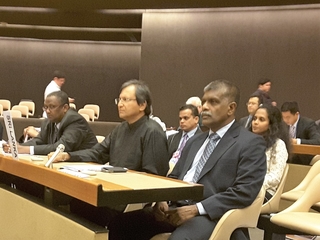
Sri Lanka participated in the 7th Meeting of the Convention on Cluster Munitions (CCM) entered into force in August 2010, held in Geneva on 4-6 September 2017, which opened today.
The attached statement was delivered by Sri Lanka’s Permanent Representative to the UN in Geneva Ravinatha Aryasinha.
Convention on Cluster Munitions (CCM) is an international treaty that addresses the humanitarian consequences and unacceptable harm to civilians caused by cluster munitions, through a categorical prohibition and a framework for action. The Convention prohibits all use, production, transfer and stockpiling of cluster munitions. In addition, it establishes a framework for cooperation and assistance to ensure adequate care and rehabilitation to survivors and their communities, clearance of contaminated areas, risk reduction education and destruction of stockpiles.
Sri Lanka’s delegation included Major General D S Weeraman psc, Brigadier W A N M Weerasinghe RSP USP and Ms. Dulmini Dahanayake, Second Secretary of the Sri Lanka Permanent Mission in Geneva.
4 September 2017
Sri Lanka Permanent Mission
Geneva

Sri Lanka said that it supports the establishment of a Group of Governmental Experts (GGE) on Lethal Autonomous Weapons Systems (LAWS) in 2017, within the framework of the Convention on Certain Conventional Weapons (CCW) and to elevate the dialogue on LAWS to a State –driven formal process.


Sri Lanka's Ambassador to the UN in Geneva Ravinatha Aryasinha expressing concern on the slow progress made over the decades on international multilateral nuclear disarmament efforts, has affirmed Sri Lanka’s support for the convening of a conference in 2017, to negotiate a legally – binding instrument to prohibit nuclear weapons, leading towards their total elimination. Sri Lanka further noted that the agreement on such a negotiation would ensure the fulfillment of the wish of the UN membership at large.
He made these observations during an intervention by Sri Lanka at the third and final session of the General Assembly mandated Open – Ended Working Group (OEWG) on Taking Forward Multilateral Nuclear Disarmament Negotiations, held in Geneva last week. During its final plenary meeting held on 19th August 2016, the Group adopted the report by vote, and recommend to the General Assembly to convene a Conference in 2017, to negotiate a legally – binding instrument, to prohibit nuclear weapons, leading towards their total elimination. The recommendation, which will be assessed by the General Assembly, is seen as a significant step towards nuclear disarmament.

Referring to the arguments made by some that “nuclear weapons are not illegal as per se and that the UN Charter has not excluded the possibility of using nuclear weapons in self – defense”, Sri Lanka said that such “existing lacuna in international law for not explicitly prohibiting nuclear weapons should not be taken as a cover to legitimize nuclear weapons, instead we should take it as a catalyst to work collectively in order to close the gaps and strengthen the international law.”
Sri Lanka’s Deputy Permanent Representative to the UN in Geneva, Mrs. Samantha Jayasuriya made these remarks on 11th May 2016 at the second session of the Open – Ended Working Group (OEWG) on Taking Forward Multilateral Nuclear Disarmament Negotiations, held in Geneva from 2-13 May 2016. She further added that a ‘step –by –step’ approach with an undefined ‘final stage’ tends to lose the momentum, and that any “undue delays in taking proactive actions or having to wait until a minimum threshold point is fulfilled by all nuclear possessing States, compromises the rights of States who are not relying on nuclear weapons for their security, and are being subjected to unfair risk of nuclear weapon detonations, accidental or intentional.”


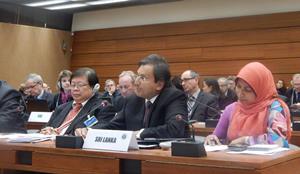
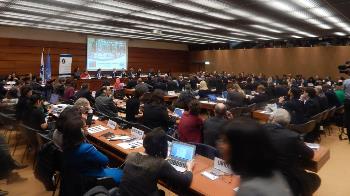
Sri Lanka’s Permanent Representative Ambassador Ravinatha Aryasinha said on Wednesday (2 March 2016) that the Cabinet of Ministers earlier the same morning had approved that Sri Lanka accedes to the ‘Convention on the Prohibition of the use, stockpiling, production and Transfer of Anti-Personnel Mines and on Their Destructions’, which is commonly known as the ‘Ottawa Convention’.
Ambassador Aryasinha made this announcement when he addressed the First International Pledging Conference for the Implementation of the Anti – Personnel Mine Ban Convention on the theme “Mine Free World by 2025: The Last Stretch”, held yesterday (2 March 2016) at the Palais des Nation in Geneva. The pledging conference was organised by the Office of the UN in Geneva and the Government of Chile marking seventeen years of success and calling on all parties to redouble their efforts to meet the humanitarian goals set by the Convention by 2025.


